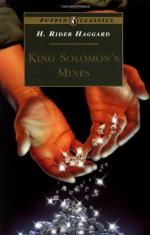As we emerged into this river-bed path suddenly we started a troop of tall giraffes, who galloped, or rather sailed off, in their strange gait, their tails screwed up over their backs, and their hoofs rattling like castanets. They were about three hundred yards from us, and therefore practically out of shot, but Good, who was walking ahead, and who had an express loaded with solid ball in his hand, could not resist temptation. Lifting his gun, he let drive at the last, a young cow. By some extraordinary chance the ball struck it full on the back of the neck, shattering the spinal column, and that giraffe went rolling head over heels just like a rabbit. I never saw a more curious thing.
“Curse it!” said Good—for I am sorry to say he had a habit of using strong language when excited—contracted, no doubt, in the course of his nautical career; “curse it! I’ve killed him.”
“Ou, Bougwan,” ejaculated the Kafirs; “ou! ou!”
They called Good “Bougwan,” or Glass Eye, because of his eye-glass.
“Oh, ‘Bougwan!’” re-echoed Sir Henry and I, and from that day Good’s reputation as a marvellous shot was established, at any rate among the Kafirs. Really he was a bad one, but whenever he missed we overlooked it for the sake of that giraffe.
Having set some of the “boys” to cut off the best of the giraffe’s meat, we went to work to build a “scherm” near one of the pools and about a hundred yards to its right. This is done by cutting a quantity of thorn bushes and piling them in the shape of a circular hedge. Then the space enclosed is smoothed, and dry tambouki grass, if obtainable, is made into a bed in the centre, and a fire or fires lighted.
By the time the “scherm” was finished the moon peeped up, and our dinners of giraffe steaks and roasted marrow-bones were ready. How we enjoyed those marrow-bones, though it was rather a job to crack them! I know of no greater luxury than giraffe marrow, unless it is elephant’s heart, and we had that on the morrow. We ate our simple meal by the light of the moon, pausing at times to thank Good for his wonderful shot; then we began to smoke and yarn, and a curious picture we must have made squatting there round the fire. I, with my short grizzled hair sticking up straight, and Sir Henry with his yellow locks, which were getting rather long, were rather a contrast, especially as I am thin, and short, and dark, weighing only nine stone and a half, and Sir Henry is tall, and broad, and fair, and weighs fifteen. But perhaps the most curious-looking of the three, taking all the circumstances of the case into consideration, was Captain John Good, R.N. There he sat upon a leather bag, looking just as though he had come in from a comfortable day’s shooting in a civilised country, absolutely clean, tidy, and well dressed. He wore a shooting suit of brown tweed, with a hat to match, and neat gaiters. As usual, he was beautifully shaved, his eye-glass and his false teeth appeared to be in perfect order, and altogether he looked the neatest man I ever had to do with in the wilderness. He even sported a collar, of which he had a supply, made of white gutta-percha.




